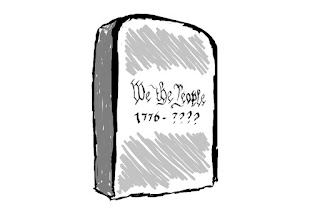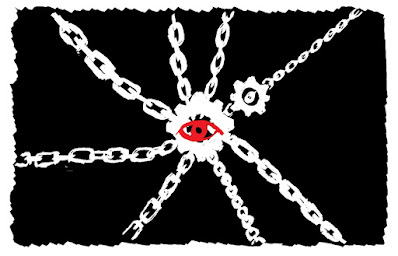If one subscribes to the notion of social progress, the sheer amount of protest and alarm emanating from the idea's own adherents today is absurd. Surely, things should have improved by now? Surely, the ills of society are at least milder than in the past?
Instead, we seem to have entered an era of exaggerated grievances. We look for stupid things to complain about, rally in protest against irrelevant half-injustices that aren't comparable with the horrendous atrocities of the past, and declare war on other people and their point of view rather than actual policies of the state.
In Westernised society, where being overweight is literally more of a problem than hunger, anything that goes even slightly awry or encumbers people's personal wishes will increasingly be subject to comparisons with major civil rights breaches and even mass murder in the past. It is why the US vice president compared the kerfuffle of January 6 2020 with past wars and mass-casualty attacks on the United States, specifically the 9/11 attacks and Pearl Harbor. It is why vaccine mandates and mask mandates are compared with the Holocaust by radical conservatives. The complete lack of resemblance between the events being compared is so staggering that it seems like a joke.
Oppression in Western societies today
For the most part, there is no real oppression in Western societies anymore, and the belief in it is just whipped up through exaggeration for one political cause or another. Nobody is being mistreated or abused on any scale of note, and the complaints are downright pathetic compared to the plight of previous generations.
We see this behaviour on both the right and the left, showing that it is common to the whole society. People on the right assert that Christians and whites are persecuted in the US, overreacting to attempts to merely maintain a secular constitution and allow equal representation. People on the left see racist utterances and behaviour as tantamount to fascism and regard themselves as resistance fighters.
Steven Pinker's The Better Angels of Our Nature makes the case that things have universally improved compared to the past, in terms of decreasing violence. People live longer, there is less hunger, and there is less to care about. When I read George Orwell's The Road to Wigan Pier, it dawned on me how lucky I am. Had I been born a century ago, literal hunger and cold would have been a regular worry in my life, rather than complaining that I should be paid more in my job or that bosses should work harder not to hurt the feelings of their employees. Go back a century further, and I could be wearing rags and living somewhere in a swamp, like some miserable character in The Lord of the Rings. Comparisons with the severe realities of the past make any complaint I might have about my life and the way someone treated me seem like frivolous nonsense.
In Western societies, we have come a long way from a past marked by hunger, war, genocide, and civil rights struggles aiming for human beings not to be treated like animals. Now, the grievances have turned elsewhere, and the concerns we have are often inane.
Currently, we have a major effort in society to root out just about anything that makes people feel uncomfortable in any way. Many refer to this as "wokeness" but it is really just social liberal militancy being continued in the absence of major injustices to work against. Journalists contribute to it, because their business is always to create moral panic and sell papers.
While some of the goals of social liberal protest are valid, like ending police executions of African Americans and the coercion against women by powerful men, other issues I will not get into border on the absurd. The cause as a whole is unfocused, too, making it just as concerned with nonsense like disapproving of the way someone talks as it is with preventing murder. Surely, there are priorities? Surely, some things are unworthy of concern and do not require any response or even comment?
Rights are at risk of being confused with privileges such as respect, approval and other people being nice to us. The desire to get rid of something as insignificant as "microaggressions", as has become a cause célèbre of some commentators and activists, is unrealistic. It confuses being treated with respect, with human rights. It borders on trying to iron out the wrinkles from other people's facial expressions.
It is not a human right that other people must express no negative assumptions about us. Other people must be permitted to be resentful and hurt our feelings, with no rational justification whatsoever, as they have always done. They must look at and speak to us however they please, and we must do nothing, because that is life. Other people are agents of their own will, and they have every right to be horrible people. Not everyone is your friend, nor should they be.
What people have done is allow rampant speculation and theorisation about their fellow citizens, including a drift towards conspiratorial and paranoid thinking on all sides and at all levels to adjust for the lack of actual material failings or true oppression to talk about. It seems we needed the real oppression. Now that it is gone, we don't know what to do and are gnawing at each other.
Rather than accept the milder sources of discomfort, namely the faults in other human beings, we risk demanding that all prejudice and stigma, no matter how minor, is ironed out like some intolerable wrinkle. But this presupposes that society can even be perfect and achieve equality of outcome at all times, or that human life can even exist in such an unprecedentedly kind society. For all we know, the implicit goal of a kind and perfect society is like wanting to breathe pure oxygen.
I am not trying to defend evil and imperfection, but to just acknowledge it will always be there, in the way Christian theologians acknowledge our world as fallen.
The search for evil
Among conservatives, the conspiratorial thinking about the pandemic and masks is precisely parallel to the nonsensical Critical Race Theory (CRT) in how it exploits paranoia and engages in exaggeration, gnawing at non-issues or even valid health policies because they can't find any true fault with the system. The fact is that radicals are no longer interested in the root of anything (the origin of the word itself) but they are interested in constructing imaginary injustices and writing a wealth of worthless drivel about them.
To believe that other people and the government advising you to get a vaccine or encouraging masks is tantamount to civil rights breaches is absurd. It might be different in Austria, where the government has actually taken coercive measures, but Germany and Austria have always been more authoritarian than Britain and America and that is their business.
Other conservatives believe even more deranged conspiracy theories, explicitly labelling all the scientific community and all the world's governments as being out to get them and even kill them. The theories are insane, but prolific on the internet, alleging global depopulation agendas, et cetera. This is the most extreme example of imagining ugliness in the world to match the grotesquery of our own primitive psyche.
There is no evidence of the evil claimed by conspiracy theorists, but their conspiracy theories are ample evidence of evil within the human mind and the bizarre human need to invent some form of Satanic force to resist.
In the perfect society, humans become blemishes
Humans are tougher than they look. We are built for adversity. Taking all adversity away may be like removing the ground we were walking on, and could have psychological or even physical results on us that we weren't aware of. If the source of unkindness is our own nature, which is possible, then trying to achieve societies of absolute kindness and inclusion may be impossible and even dangerous.
Even removing material shortages and injustices may have been a dangerous move, since it has caused us to obsess about human behaviour rather than systemic problems. Americans gnaw at one another rather than at actual repairable problems, and increasingly list other people as the problems in their lives. It is less pronounced in Britain, but has the potential to get just as bad due to the constant export of American behaviour and concerns to us through the cultural umbilical cord between the countries.
There are valid reasons, whether you subscribe to either the scientific model of evolution or to a religious theology, to believe that unkindness emanates from humans and cannot be ironed out. It may simply arise from us with no reason other than our neurology and behaviour, commanding us to find or even invent problems and continuously exert the same levels of energy to correct them.
In one of the Matrix movies, the creator of the false reality in which humanity is trapped explains that earlier iterations were perfect, but that the human mind refused to accept it. A more believable version of reality, with injustices and disappointments, was introduced instead, so that the sinful minds of humanity could accept it as real.
For those more traditional, consider the Garden of Eden. According to Genesis, humanity was given a perfect world, but became aware of good and evil. That mere awareness itself planted the seeds of wickedness, and we were cast out. As such, by attempting to create a utopia on Earth, we may not be navigating a path back to the Garden, but a path to self-inflicted evil and suffering. Even if given perfection and material abundance, or able to create it, renewed hostility under new guises will only cause us to fall again.
The fixation on minor ills in the pursuit of social justice, the rooting out of microaggressions, comparison of even the subtlest forms of prejudice or disfavour with past murder and genocide by affixing the same labels to it, is the result of a kind of utopia forming. Comfort is so high and expectations are such that true hunger and injustice are unheard of, and new problems are imagined instead. In the end, the only bad thing in our lives becomes other people. All hatred and desire to fix things becomes targeted at other people, and there is no end to it. When everything is perfect and expectations are of a perfect life devoid of all disappointment, human forms and behaviours begin to look like blemishes.
It may be that the ultimate form of society is impossible, because the primitive and violent minds of men will still search desperately for anything wrong with it and react with disproportionate hatred. The knowledge of evil begets evil because it begets fear, which is enough to motivate hatred.










